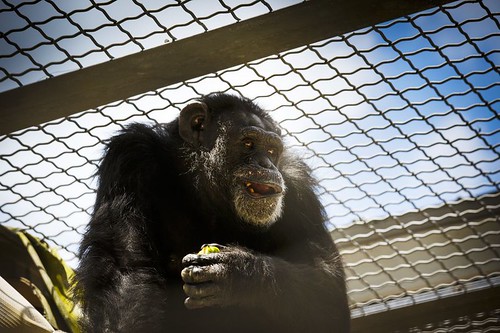歐洲專利局因技術品質有瑕疵,陸續撤銷美國Altor BioScience生技公司爭議性的基改黑猩猩專利EP1409646,以及基改大鼠與小鼠發明專利的改版。
 |
| NGO組織之一,美國佛羅里達州陽光海岸靈長類動物保護區(Suncoast Primate Sanctuary)收容的一隻黑猩猩。圖片來源:Scott Audette / Visit Florida |
修改黑猩猩DNA 專利認證惹議
歐洲專利局2012年6月核發專利EP1409646給Altor BioScience,專利內容是將黑猩猩的DNA修改成接近人類,以用於製藥研究。
Altor BioScience生技公司總部位於美國佛州,是一家私人臨床生物製藥公司,業務包括開發和量產高價值標靶免疫治療藥劑,以治療癌症、病毒感染、炎症和自體免疫疾病。
來自德國、瑞士和英國共13個組織,聯合針對Altor BioScience的基改黑猩猩專利提出異議。雖然在歐洲專利局的決定上獲得重大勝利,但反對組織也擔憂這並不代表歐洲專利局在政策上有所改變。
反對方認為這個專利違反了專利法的倫理。珍古德基金會、德國野生黑猩猩基金會等13個反對組織呼籲給予實驗動物更多的尊重。
野生黑猩猩基金會Christophe Boesch教授表示:「我們知道巨猿不但能感受痛苦和壓力,甚至有證據顯示牠們具有類似人類的意識。越深入研究黑猩猩和倭黑猩猩的行為,是否該賦予牠們近似人類的法律地位這個問題就更具爭議性。這個議題顯示,我們應以更高的倫理標準對待巨猿。」
反對者主張,專利法禁止動物品種相關專利,而歐洲專利局核發專利的依據有法律詮釋上的爭議。歐洲目前已發出1,500張和動物及動物的使用有關的專利。
違反倫理 民團遊說資方 業界反應不一
德國研究機構Testbiotech近日發表報告顯示,基改動物的專利和市場需求是動物實驗數量增加的主因。
為了阻止企業透過增加動物的痛苦而獲利,Testbiotech正在遊說銀行等投資人設立清楚的投資倫理規範。Testbiotech在2012至2014年間和多個組織共提出4個異議案件,反對基改黑猩猩的專利,相關企業反應不一。
數月前,澳洲公司Bionomics宣布不再申請基改動物專利。相反的,擁有兩項歐盟核發、以昆蟲DNA基改黑猩猩專利的美國公司Intrexon,則堅持保留其專利。
Intrexon專利異議案的聽證會將於9月29日於海牙歐盟專利局舉行。
The European Patent Office has revoked the patent EP1409646 held by Altor BioScience. After the U.S. company withdrew its controversial claims on genetically engineered chimpanzees, the EPO has now also revoked a changed version of the patent claiming genetically engineered rats and mice as inventions.
Based in Florida, Altor BioScience Corporation is a privately-held, clinical-stage biopharmaceutical company engaged in the discovery, development and commercialization of high-value, targeted immunotherapeutic agents for the treatment of cancer, viral infections, inflammatory and autoimmune diseases.
The European Patent Office made its decision on the basis that there were flaws in the technical quality of the patent.
Thirteen organizations from Germany, Switzerland and Great Britain filed a joint opposition against a patent on genetically engineered chimpanzees granted to Altor BioScience.
The opponents believe this patent revocation is “an important success,” but warned in a statement today that it does not indicate a general change in the legal practice of the European Patent Office.
Patent EP1409646 was granted by the European Patent Office in June 2012. It allows chimpanzees to be manipulated to make their DNA similar to that of humans, and then used in pharmaceutical research.
The opposition argued that this patent violates ethical provisions in patent law.
The opponents – Albert Schweitzer Stiftung fuer unsere Mitwelt, Deutscher Tierschutzbund, Gen-ethisches Netzwerk (GeN), GeneWatch UK, Gesellschaft für oekologische Forschung, Jane Goodall Institute, No Patents On Life!, Menschen für Tierrechte, Pro Wildlife, Schweizerische Arbeitsgruppe Gentechnologie, Schweizer Tierschutz, Testbiotech and the Wild Chimpanzee Foundation, Germany – are calling for animals to be treated with more respect.
Professor Christophe Boesch for the Wild Chimpanzee Foundation said, “We know great apes in particular not only suffer from pain and stress, but also exhibit evidence of consciousness akin to that of humans. Research into animal behavior in species such as chimpanzees and bonobos has fostered a strongly emerging debate about whether these non-human and highly protected animals deserve to be given a legal status similar to that of humans.”
“This debate is a strong signal that great apes must be treated with very high ethical standards,” said Boesch. “The Patent Office is violating basic ethical standards.”
The opponents say the European Patent Office is granting patents on animals based on a controversial legal interpretation despite the patent law that prohibits patents on animal varieties.
Around 1,500 patents that concern animals and their usages have already been granted in Europe.
Testbiotech recently published a report showing that patents and market interests in genetically engineered animals are factors driving the increasing numbers of animal experiments.
To stop companies from making profits from animal suffering, Testbiotech is appealing to investors such as banks to set clear standards for ethical investment. In this context, Testbiotech is today publishing a dossier on the internet platform ‘Banktrack.’
Between 2012 and 2014, Testbiotech together with several other organizations filed four oppositions against patents on genetically engineered chimpanzees, triggering various reactions from the companies concerned.
Some months ago, the Australian company Bionomics announced it would step back from claims covering genetically engineered animals.
In contrast, the U.S. company Intrexon, which holds two European patents on great apes which are manipulated with DNA derived from insects, wants to uphold its patents.
A public hearing on the opposition against the patents held by Intrexon will take place on September 29 at the European Patent Office in The Hague.
※ 全文及圖片詳見:ENS







